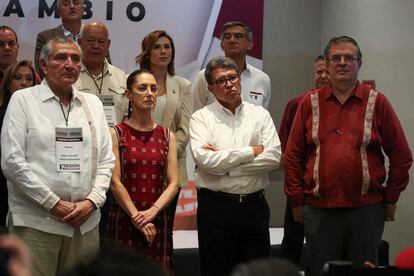The ‘dirty war’ of succession within Morena, Mexico’s ruling party
Just 10 days into the campaign, the presidential contenders are ripping into each other despite pleas for unity and threats of disqualification

“There shall be no public arguments, squabbles or hostility among the contenders, or any attempts to discredit or disqualify each other. Their supporters must strictly adhere to the same rule.” That was one of the pledges the six contenders to succeed President Andrés Manuel López Obrador signed at his party’s national council meeting on June 11. The National Regeneration Movement (Morena) wants to maintain unity in the race for the party’s presidential nomination. But less than two weeks later, that script has been tossed aside and a new narrative is emerging. Virtually every contender has launched complaints, accusations and insinuations amid press leaks, disparaging headlines and loudly voiced suspicions about attempts to undermine political rivals.
A video released this week by ex-Foreign Minister Marcelo Ebrard’s team ominously warned, “The march towards the presidency has commenced, igniting a dirty war.” Ebrard called out a Contralínea investigative report headlined, “The judicial record that Marcelo Ebrard would like to disappear,” which was published the night before national campaigns officially kicked off. Ebrard’s team retorted that the article dredged up old allegations dismissed in 2017 that were part of former President Enrique Peña Nieto’s campaign of “political persecution” of Ebrard.
“Who’s who in the dirty war?” is the title of Ebrard’s video, which claims that some attacks on the candidate are “friendly fire” from within the party, coming from “certain digital outlets and bot farms aligned with other candidates.” The “dirty war” reference echoes the president’s frequent complaints in his morning press briefings about critical media reports and editorials. “All these efforts are aimed at targeting Marcelo [Ebrard] and knocking him out of first place,” says the narrator of the video. Ebrard’s dirty war claims are not new. Even before the rules of succession were established, in mid-May he publicly denounced a coordinated effort on social media to undermine his credibility.
Ebrard has also accused his rivals and other party members of “wasteful spending” and “vote rigging,” and has threatened to file formal complaints to prevent them from gaining an unfair advantage. Mexico City’s former head of government Claudia Sheinbaum, the leading Morena candidate in most polls, denied any “squandering” and pledged transparency about the resources spent on her massive rallies of late.
Sheinbaum’s Jewish heritage has made her the target of a smear campaign laced with xenophobia and anti-Semitism. False rumors have circulated that she is not a Mexican citizen and was “born in Bulgaria.” The lone woman in the group shared her birth certificate on social media, but later deleted it. ”I am pure Mexican,” declared Sheinbaum, who denounced “misogyny in our society and among my colleagues.”
Sheinbaum has not been immune to leaks either. An open microphone recorded her saying, “I’ve had enough,” to Alfonso Durazo, the governor of Sonora (northwest Mexico) and Morena’s national council president. The recording was leaked just a few days after Morena announced the rules of engagement for its presidential contenders. According to another presidential hopeful, Gerardo Fernández Noroña, Sheinbaum’s gripe came after supporters of other candidates greeted her with shouts of “fair play,” despite the agreement to refrain from internal attacks.
In an interview with EL PAÍS, Fernández said that the demands for “fair play” from candidates like Ebrard refer to an internal Morena bias that is causing friction among the candidates. “I’m not complaining about anything, but it’s clear that the movement’s entire political structure is oriented toward one candidate,” he said. The Labor Party (PT) candidate has also complained about damaging false rumors, like the speculation that the PT wants him to bow out of the race in favor of another candidate. “All lies,” he declared.
Former Interior Minister Adán Augusto López exploded this week at journalist Carlos Loret, who reported the improper use of military aircraft by relatives of congresswoman Andrea Chávez, one of his main supporters. “It’s part of the dirty war,” said López, who accused Loret of being “misogynistic” and “cowardly.” López, who hails from Tabasco (southeast Mexico) has also been the target of social media rumors about his relationship with Chávez and other aspects of his personal life. Meanwhile, Chávez alleges that it’s all “a disinformation campaign” by political rivals.
“I implore everyone to refrain from lodging complaints, as it hampers our internal cohesion,” said Senator Ricardo Monreal. Despite his disapproving remarks about the other contenders’ banners and billboards, he pledged not to file a single complaint. “I refuse to undermine the progress we have achieved thus far.”
President López Obrador repeated on June 28 that Morena remains united. “Our adversaries will be disappointed if they think our movement will fracture,” he said, guaranteeing party solidarity will remain intact after its internal poll on September 6. “There are those who have their preferences, but once we reach a resolution, unity will prevail,” he added confidently. “Even if someone persists in prioritizing personal interests over the common good, it won’t matter because the people want progress.”
The obvious points of friction range from internal funding and polling methodology to some rather absurd prohibitions on candidates that are difficult to enforce. Morena’s careful balancing act to uphold electoral laws that prohibit premature campaigning has certainly added a layer of complexity to the entire process. Political analyst Enrique Gutiérrez told EL PAÍS in mid-June: “They’re operating on the edge of what is allowed and what is not. They’re in this space where there’s a political agreement of civility among the candidates, but it’s a kind of limbo with no clear rules or sanctions because the pre-campaign has not formally started.”
“Unity and mobilization” read the banner at Morena’s candidate registration event. This is the territory staked out by the governing party as it searches for a candidate and strives to maintain unity so it can remain the dominant political force in the 2024 elections.
Sign up for our weekly newsletter to get more English-language news coverage from EL PAÍS USA Edition
Tu suscripción se está usando en otro dispositivo
¿Quieres añadir otro usuario a tu suscripción?
Si continúas leyendo en este dispositivo, no se podrá leer en el otro.
FlechaTu suscripción se está usando en otro dispositivo y solo puedes acceder a EL PAÍS desde un dispositivo a la vez.
Si quieres compartir tu cuenta, cambia tu suscripción a la modalidad Premium, así podrás añadir otro usuario. Cada uno accederá con su propia cuenta de email, lo que os permitirá personalizar vuestra experiencia en EL PAÍS.
¿Tienes una suscripción de empresa? Accede aquí para contratar más cuentas.
En el caso de no saber quién está usando tu cuenta, te recomendamos cambiar tu contraseña aquí.
Si decides continuar compartiendo tu cuenta, este mensaje se mostrará en tu dispositivo y en el de la otra persona que está usando tu cuenta de forma indefinida, afectando a tu experiencia de lectura. Puedes consultar aquí los términos y condiciones de la suscripción digital.









































